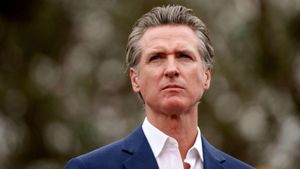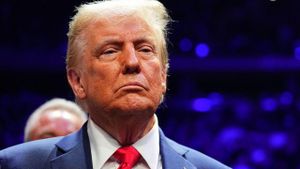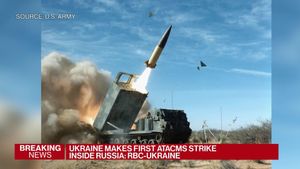MONTREAL — The tension on the streets of Montreal boiled over last week when an anti-NATO protest turned violent, leaving local officials scrambling to respond and the public shocked. Quebec Premier François Legault has publicly demanded action from law enforcement, emphasizing the need for swift arrests following the outbreak of violence. On Tuesday, during discussions with reporters, he stated this situation required urgent action, saying, "There must be a very clear message sent to these thugs... they will be punished, and there will be consequences for what they have done." This marked one of the first times Legault has spoken directly about the incident, highlighting his expectations for increased police activity beyond the three arrests made so far.
Montreal's police chief, Fady Dagher, confirmed the challenges law enforcement faced, noting the majority of participants at the protest were masked. The demonstration, which gathered about 800 individuals, had been organized by Divest for Palestine and CLAC (Convergence des luttes anticapitalistes), groups opposing NATO due to its perceived support for Israel. Dagher asserted, "It’s very difficult for them to anticipate and to block them from demonstrating because demonstrating is a right in Canada. So any human being has the right to demonstrate." This avenue of protest sparked violent actions, including vandalism and assaults, raising serious concerns about public safety and law enforcement's effectiveness.
The protest devolved when some attendees, identified by police as members of an extreme-left group, began smashing windows and setting fire to vehicles near the NATO conference venue. Protesters filled fire extinguishers with paint and sprayed them at riot police to obstruct their vision. Dagher described these demonstrators as elements who had "nothing to do" with the broader pro-Palestinian protestors present, which complicates matters for organizers who seek peaceful discourse. They are facing scrutiny for their inability to prevent others from infiltrative violence during such events.
Further complicity arose when reports surfaced of antisemitism during the protests, including derogatory chants, prompting immediate backlash from local leaders. Prime Minister Justin Trudeau condemned the violence, asserting, "While people have the right to demonstrate there should never be any violence," and emphasized the necessity of prosecuting the perpetrators to the highest degree.
Reactions from protest organizers also added layers to the narrative. Benoît Allard, spokesperson for Divest for Palestine, acknowledged the frustration felt among demonstrators who attempted peaceful protest and felt ignored. “What I felt... was enormous anger from people who have mobilized for over a year,” he remarked. The group’s presence was partially spurred by earlier limited media coverage of their peaceful protests against NATO member states supplying weapons to Israel, which led to feelings of desperation and, eventually, violent outbursts as seen last Friday.
This protest violence is not isolated. Dagher remarked on the history of demonstrations exceeding 400 since the onset of the Hamas attack on Israel on October 7th, with the vast majority remaining peaceful. The police chief lamented the relatively light consequences faced by individuals who vandalize property during protests, believing fines do not deter them from future violence. He proposed the need for more substantial punitive responses to dissuade such actions.
On social media, discussions around police conduct surfaced as well. Adam Scheier, a local rabbi, reported feeling unsafe and being asked to leave the vicinity of another protest, raising concerns over how authorities manage perceived threats. "The policeman explained to me... my presence is deemed sufficient provocation for removal..." Scheier expressed disbelief at the police prioritizing his departure over chants of hatred allowed to escalate during protests.
The code around mask-wearing during protests also reentered public discourse following the recent violence. A former bylaw prohibiting masks at demonstrations was repealed due to constitutional issues raised back in 2016. The police chief noted this change limits their ability to intervene preemptively. Mayor Valérie Plante defended the decision at the time, asserting the necessity of protecting citizens' rights to anonymous demonstration without constant surveillance.
The ramifications of the protest ripple beyond immediate violence and property destruction. The conversations highlight underlying social tensions and the severe divisions within communities—especially concerning Israel and Palestine—and how protests can reflect those sentiments. Some may argue these protests are warranted as expressions of dissent, yet when they evolve violently, they shift both public perception and media narrative toward condemnation.
The looming question for Montreal is how the city can balance the rights of protestors to assemble with burgeoning incidents of violence threatening public safety. The story remains fluid; with police promising more arrests and the community grappling with the fallout, the upcoming days will be pivotal for Montreal's social climate. Many are watching closely to see whether the city can navigate this turbulent path without losing its core democratic principles.



